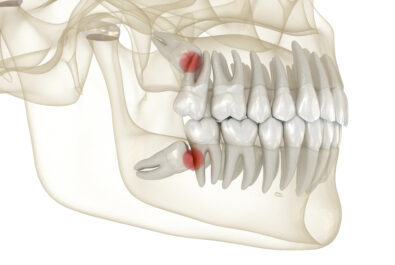Sensitive teeth can be caused by a number of oral health issues, including cavities, small fractures or cracks, exposed roots, and worn tooth enamel, to name a few. The treatment for sensitive teeth depends on what the cause is, but there are measures you can take to prevent them from becoming an issue. For instance, practicing better hygiene can alleviate many cases of sensitive teeth by helping the enamel around them regain their strength.
Good Daily Hygiene Tips
An effective daily hygiene routine will protect your teeth from bacteria and bacterial plaque that cause tooth decay and gum disease. If plaque is allowed to remain on your teeth for more than 48 hours, it calcifies (hardens). This hard substance, called tartar, is insoluble in water and requires a professional cleaning at your dentist’s office to remove. Tips for maintaining a good hygiene routine include:
- Brushing—Brushing too harshly irritates your gums, causing them to recede from your teeth. It could also wear away tooth enamel, the protective layer around your teeth. Avoid toothbrushes made of harsh material. Instead, use a soft-bristled brush that has been approved by the American Dental Association. And take your time. Be sure to brush every side of each tooth thoroughly, including the chewing surfaces.
- Flossing—Brushing your teeth cleans the surface of your teeth, but your toothbrush cannot reach the crevices in between your teeth, where plaque-forming debris is fond of lodging itself. Carefully flossing your teeth will prevent this debris from resting in these crevices long enough to cause bacterial infection.
- Protection—Besides cavities and bacteria, trauma can also cause a tooth to become sensitive. A crack or fracture in a tooth exposes the tooth’s pulp (the center of the tooth, which houses nerves and blood vessels). Wearing a mouthguard during contact sports or extreme activities can protect your teeth from trauma. Also, avoid biting down on hard substances, such as ice, hard candy, or inedible objects like pens and pencils. The undue stress can also cause your tooth to crack or chip.
ABOUT YOUR CERRITOS ORAL SURGEON:
Shawn Hofkes, DDS, is highly qualified to address complex issues, including the diagnosis and treatment of destructive gum disease. To schedule your appointment or consultation with Dr. Hofkes, contact us today by calling (310) 663-6683. We proudly serve patients of all ages from Cerritos, Lakewood, Long Beach, Buena Park, and all surrounding communities.














